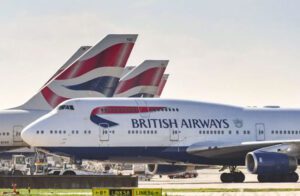
British Airways parent company International Consolidated Airlines Group (IAG) has committed to a massive $23 billion aircraft order, brushing off concerns about softening transatlantic travel demand amid President Trump’s escalating global trade wars.
In a confident update to investors, the £14 billion FTSE 100 airline group said it remained on track to hit its €4.6 billion profit forecast for 2025, adding that passenger demand remained “robust” despite broader economic uncertainty.
IAG’s announcement comes just weeks after rivals including Lufthansa, Air France-KLM, and US airlines issued warnings about weakened bookings across the North Atlantic, citing volatility caused by new tariffs and macroeconomic headwinds.
“Whilst being mindful of geopolitical and macroeconomic uncertainty, our outlook for the full year is unchanged,” the group said in a trading statement. “We are continuing to see good demand for air travel across our core markets.”
IAG confirmed it will acquire 32 Boeing 787-10 Dreamliners, priced at more than £10 billion at list value, alongside 21 Airbus A330-900neo aircraft, valued at $6 billion. The group also secured purchase options for 10 more 787s and 13 additional A330s, bringing the total commitment to more than $23 billion at catalogue prices.
However, such bulk orders usually involve heavily discounted pricing, and with both Boeing and Airbus facing production challenges, analysts expect the final outlay to be significantly lower.
The new aircraft will strengthen IAG’s position on transatlantic routes, expand Level, its Latin America-focused budget carrier, and replace older planes operating on costly short-term leases.
The move will also help streamline IAG’s fleet, which already totals more than 600 aircraft.
Rolls-Royce left out of engine deal
While the order is positive news for both aircraft manufacturers, it is a mixed outcome for UK-based Rolls-Royce. Though it remains the sole engine supplier for the A330-900neo, IAG has opted to fit its new 787s with General Electric engines, snubbing Rolls-Royce’s Trent 1000, which has been plagued by reliability issues in recent years.
IAG’s aggressive fleet expansion comes on the back of a better-than-expected first quarter, traditionally the weakest period for airlines in the northern hemisphere. The group reported an operating profit of €198 million, nearly triple the previous year’s result and well ahead of analysts’ consensus forecast of €133 million.
Revenue rose nearly 10% to €7 billion, even as passenger numbers dipped slightly to 26.1 million, reflecting continued fare inflation across the industry.
The company noted that while US leisure demand in economy cabins had softened, this was being offset by strong premium cabin sales and stable demand across Latin America and Europe.
Shares in IAG held steady at 290.6p on Friday morning, having recently recovered some ground following a near-40% slump earlier this year triggered by trade war fears.
Despite political uncertainty and economic jitters on both sides of the Atlantic, IAG’s order signals confidence in the long-term outlook for global travel, particularly on lucrative long-haul routes.
Analysts say the order could help IAG position itself to take advantage of future capacity gaps, as both Boeing and Airbus face lengthening delivery timelines and a backlog of orders from rival carriers.
If demand rebounds sharply in 2026 and beyond, IAG could be one of the best-prepared legacy carriers to capitalise on the recovery — with a younger, more fuel-efficient fleet ready to deploy.
Read more:
British Airways owner IAG splashes out $23bn on new planes despite US trade war fears






